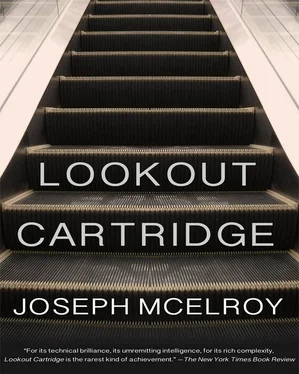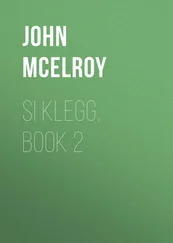Joseph McElroy - Lookout Cartridge
Здесь есть возможность читать онлайн «Joseph McElroy - Lookout Cartridge» весь текст электронной книги совершенно бесплатно (целиком полную версию без сокращений). В некоторых случаях можно слушать аудио, скачать через торрент в формате fb2 и присутствует краткое содержание. Год выпуска: 2014, ISBN: 2014, Издательство: Dzanc Books, Жанр: Современная проза, на английском языке. Описание произведения, (предисловие) а так же отзывы посетителей доступны на портале библиотеки ЛибКат.
- Название:Lookout Cartridge
- Автор:
- Издательство:Dzanc Books
- Жанр:
- Год:2014
- ISBN:9781941088036
- Рейтинг книги:3 / 5. Голосов: 1
-
Избранное:Добавить в избранное
- Отзывы:
-
Ваша оценка:
- 60
- 1
- 2
- 3
- 4
- 5
Lookout Cartridge: краткое содержание, описание и аннотация
Предлагаем к чтению аннотацию, описание, краткое содержание или предисловие (зависит от того, что написал сам автор книги «Lookout Cartridge»). Если вы не нашли необходимую информацию о книге — напишите в комментариях, мы постараемся отыскать её.
Lookout Cartridge — читать онлайн бесплатно полную книгу (весь текст) целиком
Ниже представлен текст книги, разбитый по страницам. Система сохранения места последней прочитанной страницы, позволяет с удобством читать онлайн бесплатно книгу «Lookout Cartridge», без необходимости каждый раз заново искать на чём Вы остановились. Поставьте закладку, и сможете в любой момент перейти на страницу, на которой закончили чтение.
Интервал:
Закладка:
Now the smell was the bristling rough moist salt of pork chops, a smell that sneaks beneath the tongue unlike lamb whose essence winds among stomach, eyes, and sinus first, and Ruby was unlocking and opening the door as Sub was yelling Who is it and then was suddenly behind her, then abruptly six strides back into the kitchen to the stove and I was looking not at him but out past the hall into the living room where Aut’s (if it was Aut’s) burglar had been — and as I said No in answer to his question had I eaten, I stepped through an invisible gate into that living room and barely registered Tris engrossed in a new or at least smaller TV set because I was seeing something else near my suitcase and seeing it with such completeness you might have thought that I was in a position to take for granted the rest.
The thing was a Halloween jack-o’-lantern, fired up and grinning through its mad half-evolved teeth, fat and in its healthy meridian grooves seeming symmetrical, and it said to me that I must have lost a week or ten days somewhere in my flights. Mad but possible.
Ruby had one hand in mine and the other through my legs. She didn’t want me to color, she wanted a story about me and her daddy. But though I loved her, the supple backbone the wide eyes taking whatever there was to take, the smudge of magic marker blue below one cheekbone, loved the flesh smell of a child (which was also Jenny’s smell now she’d stopped using a spray) as I loved Tris for his tongue-between-lips arrest absorbed in what he was seeing and thus seeming tenderer in that force you feel even in an older boy that you imagine isn’t in a more self-possessed girl, even a little girl, loved them because they were my friend Sub’s children, loved them because they could be entertained quite simply, though in the circuits of the last few days I could not recall just what I had told them by way of a story, it had come out of my head unplanned and restored itself to its spot under a baffle in a corner of my head at once it was finished — loved them because they were my own children a few years back in the multiplied accelerations of alien time that no record can begin to measure of the presents brought home to them from America (even those encapsulated or nonencapsulated liquid crystal kits acquired for Will from my scientific firm that were a steal at the price, or black-and-white moiré patterns or kinetic-art-kit mobiles for Jenny in all the colors of English wildflowers). Love, yes: but not this time, not right now.
I could eat and get to Outer Film in an hour, and if I let it go till later there’d be a night watchman I imagined downstairs tilting back in his chair behind the glass street-doors of the building reading the News and drinking coffee out of a cardboard container; but if I went soon I could be still part of the working day.
There were calls for me, and this had no doubt been why Monty wanted me to phone Sub before I left. Gilda. Claire. Monty Graf. My mother. Monty Graf again. June. Monty again.
Sub, if I asked him about his work, said it would bore me and if I said I’d like to know what he knew about computers, he’d say don’t waste your time they’re unbelievably dumb, and I could not push it because I might not be competent to tell why I thought computers part of a strange, seductive chance that was beyond the useful, and in fact I had failed more than once to make this clear to Lorna and to Geoff Millan, yet always I felt not so much because I didn’t know enough as because I had failed to make use of what I already had. I would like to give a compressed explanation to Tessa that she would not be able to anticipate with a look or a word and that would be as sly and lucid as she. And at this instant, hearing Sub come out of the kitchen and stand on the threshold of the littered living room and not speak, I found that though my power to prove my feeling about computers — about miles of memory, or abstract numbers switched out of the blue into the real angular turns of a machine or the actual relation of two electric currents — stirred inchoate though contained inside a circle of broken connections that could get long or short or acquire right angles and stern diagonals while being still this chele of known emotions and words and people, my power to turn that inchoate into a statement was, as if half unwilled, finding itself in the new movements after the ruin of the film that my pulses from moment to moment were deciding to make. I grant that if you let all this boil it might boil down to being selfish, spending money that wasn’t only mine, using friends and their phones. But if there was a glinting mass I could not frame, it seemed now to be becoming an argument that was my life. If my life was becoming an argument my mind could not frame, at least I was in that argument. Tessa’s lost mother played Schumann at night to her when she was going to sleep. After her mother wasn’t there any more she didn’t herself try to play. But she listened, she knew what was coming, she gave Lorna the letters of Clara Schumann, she loved to listen to Lorna because the sound communicated with the lost wandering sound waves of her mother’s playing and in 1958 and 1959 this gave Lorna a reason to play. But there was music in Tessa’s circle. Dudley said, The Jews own the violin. Tessa seemed not intimate enough with Dudley to say jokingly, You bigot.
For a second I could not recall if there was or was not Halloween in the land where after all I’d brought up my children and where anyway I knew there were no pumpkins. Sub explained that Rose had brought this pumpkin from the country yesterday together with the Indian corn for which, though it was still almost two weeks to Halloween, five weeks to Thanksgiving, and nine until Christmas, we should give thanks. Who cut the teeth? I asked. Sub said he had. Sub had explained over the transatlantic phone last night what had been done to this living room. I was going to pay for the TV of course, I said; and Sub, wishing to drop the subject now I’d said what I ought, made it obvious he wanted to talk further about what the burglar was looking for, but Sub did not want Tris and Ruby to hear. So we sat down and divided the four pork chops. Ruby had set the kitchen table. Sub got mad at Tris for not turning the TV off, then when Tris got up Sub strode out of the kitchen and turned it off himself. The pork chops were as good as English pork, though as I told my companions, chicken wasn’t as good here. Sub gave Ruby’s bone to Tris. Ruby said it was nice of Mommy to bring the pumpkin and could she take some Indian corn tomorrow for Show and Tell. Tris said, She’s just making that up. Sub said she could if she wanted. Make it up? said Tris. No, take it in, said Sub. Tris asked why chicken was better in England.
Claire, Gilda, Monty, my mother, and June. Still no call from Aut. June could be operating for the man in glasses and she might not know it was really for Phil Aut. I had not told Sub of the stabbing and Jim. It had been Jim.
Sub asked if I wanted coffee or tea.
Sub mentioned an old movie on TV. Tris and Ruby said they wanted to watch it. Sub said it came on too late and they were going to bed. There was more talk about what was happening when. Sub told them to go to their rooms and give me a chance to make my phone calls.
Sub had begun automatically to do the dishes. He lowered his voice and said, That burglar wanted something.
I said I was sorry. I said I might be in trouble, I had to find my own way through it but in any case we’d gone beyond the stage at which certain interests would imagine they could oppose me by rifling Sub’s apartment. Sub said he had repacked my case — but had the burglar gotten anything? and what interests?
I said some pages Jenny had typed, I had copies. I promised it wouldn’t happen again (and thought this sounded more like making a promise to myself).
Читать дальшеИнтервал:
Закладка:
Похожие книги на «Lookout Cartridge»
Представляем Вашему вниманию похожие книги на «Lookout Cartridge» списком для выбора. Мы отобрали схожую по названию и смыслу литературу в надежде предоставить читателям больше вариантов отыскать новые, интересные, ещё непрочитанные произведения.
Обсуждение, отзывы о книге «Lookout Cartridge» и просто собственные мнения читателей. Оставьте ваши комментарии, напишите, что Вы думаете о произведении, его смысле или главных героях. Укажите что конкретно понравилось, а что нет, и почему Вы так считаете.












